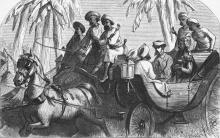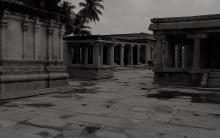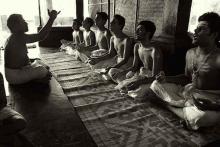It has been seventy years since I bade farewell to my schooling (1902). I've now analyzed my life through these seventy years and I have learned two lessons from it:
1) The planning of the lessons and the methods using which students were taught were good back in the past; there were no faults back then.
2) To get the most out of studying a topic, the manner in which the student understands must have consistency and should be devoid of loopholes.
I believe that the above points are important to be understood in today’s context.
Author:hari
For people who have read ancient works like Mahābhārata it is quite evident that this book is all about worldly affairs; The independence, carefree attitude, villainy, wickedness, gambling, adultery, heroism etc. Since it happens in life so it is in literature, but the problem here is the problem of the Koṇas. Koṇa not only refers to the dirty, slow moving, quadrupedal animal specialty (i.e. Male buffalo); it also refers to a dim-witted, coarse mannered biped too.
History and Biography – these two genres of literature are new to our country. They are not particularly ancient to any country.
In this essay, when I say ‘history’ I’m referring to the history of a certain geography or a land and when I say ‘biography’ I’m referring to the personal history of a famous man or woman. We shall see the details in due course.
Introduction
Composing verses on the fly in an incessant fashion and recalling them at will (dhārā and dhāraṇā) are two important aspects of Avadhānam. In Avadhānam, if impromptu poetry is Śiva, memory is Śakti. The former is forever crippled without the latter.[1]
ಹೀಗೆ ಆನಂದವರ್ಧನನ ಮತ್ತು ಅವನ ಕೃತಿಯ ಮೌಲಿಕತೆಯನ್ನು ಮನಗಂಡ ಬಳಿಕ ಧ್ವನ್ಯಾಲೋಕವು ಪ್ರತಿಪಾದಿಸುವ ಕೆಲವು ಅಮೂಲ್ಯಸಂಗತಿಗಳನ್ನು ಗಮನಿಸಬಹುದು.[1] ಈಗಾಗಲೇ ಧ್ವನ್ಯಾಲೋಕವನ್ನು ಕುರಿತು ಕನ್ನಡದಲ್ಲಿ ವಿಪುಲವಾದ ಕೃಷಿ ನಡೆದಿರುವುದರಿಂದ ಆ ಗ್ರಂಥದ ಮುಖ್ಯಪ್ರಮೇಯಗಳನ್ನಷ್ಟೇ ಇಲ್ಲಿ ನಿರೂಪಿಸುವುದಾಗುತ್ತದೆ. ಇದಾದರೂ ನನಗೆ ಕಂಡುಬಂದ ಸ್ವಾರಸ್ಯಗಳನ್ನು ಒಂದೆಡೆ ಕ್ರೋಡೀಕರಿಸುವ ಪ್ರಯತ್ನವಷ್ಟೇ.
My Dedication to Lessons
My maternal uncle prepared me for all the above lessons. A special part of this was dedicated to mathematics. Its machinations went something like this –
Dhanika quotes a śloka from the Bṛhatkathā and two ślokas from the Brahat-kathā-mañjarī. It seems like he had named his work Kathā-sarit-sāgara by Somadeva’s times. We cannot say this with certainty either! It is quite possible that the Bṛhatkathā kept growing in this manner and finally, in Kashmir, it took the form of the work of eighteen lambakas. It is not unlikely that this is an imitation of the eighteen parvans of the Mahābhārata.
“ಝಳದ ಝಾಡಿಗೆ ಹೆದರಿ ಸೂರ್ಯನನುಳುಹುವನೆ ಕಲಿರಾಹು”, “ಕರಣ ಬಿಂಬದ ತತ್ತಿಗಳನುತ್ತರಿಸಿ ತೋರುವ ತಿಮಿರವುಂಟೇ”, “ಉರಿವ ಪೇಟೆಗಳಲಿ ಪತಂಗದ ಸರಕು ಮಾರದೆ ಮರಳುವುದೆ”, “ಗರ್ಭ ಬಲಿಯದೇ ಹಗಲನೀದುದು ರಾತ್ರಿ”, “ಕುಡಿಕುಡಿದುಗುಳುತ್ತಿರ್ದವು ತಿಮಿರವನು ಕರಿ ದೀಪ್ತಿ ಕಾಳಿಗಳು”, “ಮಂಜಿನ ಮಳೆಗೆ ಕುಲಗಿರಿ ಕರಗುವುದೇ”, “ಮೇಘದ ಮರೆಯ ಹೊಕ್ಕರೆ ರಾಹು ಬಿಡುವನೇ ಉರಿವ ರವಿ ಮಂಡಲವ”, “ಅರಗಿನರಸನ ಬಾಗಿಲಲಿ ದಳ್ಳುರಿಗೆ ಕಡವೇ”, ಇಂತಹವು ಸಾವಿರಾರು ಪ್ರತಿಮೆಗಳು, ಕುಮಾರವ್ಯಾಸನ ಭಾಷಾ ಪ್ರಯೋಗದಲ್ಲಿ ಹಾಸುಹೊಕ್ಕಾಗಿವೆ. ಅಭಿಮನ್ಯುವಿನ ಮರಣದ ನಂತರ ಪಾಂಡವರ ದುಃಖವನು ವರ್ಣಿಸುವ ಈ ಮನೋಜ್ಞ ರೂಪಕವನ್ನು ಗಮನಿಸಿ.










